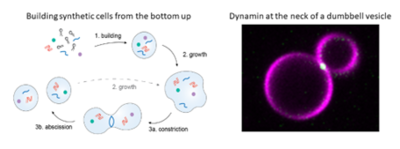PhD position (4 years)/Postdoc position (3 years):
Synthetic cell division
Joint position with the Gijsje Koenderink & Cees Dekker labs @ Bionanoscience Department, TU Delft
Job description
Living cells are highly complex systems made of countless lifeless molecular components. We do not understand how these interact to form a living cell that sustains itself, grows and divides. The BaSyC initiative is a collaborative 10-year research program that aims to understand ‘how life works’ by building an autonomous self-reproducing synthetic cell from the bottom up. As a container, we use giant unilamellar vesicles, which are cell-sized, lipid bilayer-enclosed reaction compartments that can be visualized by real-time microscopy and directly manipulated using biophysical tools. The Koenderink and Dekker labs study the process of cell division, which requires constriction of the cell into a dumbbell-shape, followed by neck abscission to split the cell into two daughter cells. Since the mechanism of abscission is still poorly understood, it remains a big challenge in the synthetic cell field to achieve robust cell division.
This experimental biophysics project aims to achieve robust synthetic cell abscission based on a thorough understanding of the required membrane remodeling process. You will reconstitute a minimal protein-based machinery for abscission, based on proteins such as the bacterial dynamin A and the ESCRT-like bacterial PspA. We anticipate that robust abscission requires these protein machineries to work in conjunction with lipid-based mechanisms that generate high spontaneous curvature at the neck. Asymmetries in head group size between the outer and inner leaflets triggered enzymatically or by photoactive lipids can for instance introduce high local curvature. Using quantitative confocal microscopy you will study how membrane binding and the abscission activity of the dynamins depend on lipid composition, whether dynamins have any intrinsic ability to generate curvature themselves, and what is the optimal neck diameter to achieve abscission. To create narrow necks, you will use optical-tweezers available in the Koenderink lab and DNA-nanotechnology tools from the Dekker lab. You will closely collaborate with other groups within the BaSyC consortium to ensure that the abscission pathway is compatible with other functionalities of the synthetic cell. The project will furthermore be carried out in close interaction with the groups of Siewert-Jan Marrink (Groningen) and Timon Idema (Delft), who will investigate abscission with simulations and analytical calculations.
The research environment: You will be co-supervised by Gijsje Koenderink and Cees Dekker and will be embedded in both teams, which are conveniently located in the same department. The Gijsje Koenderink lab is an experimental biophysics lab that studies mechanisms of cell morphogenesis by bottom-up synthetic biology. The Cees Dekker lab is an experimental biophysics lab that explores a range of subjects from nanopore sequencing to chromosome biology, including microfluidics research. Both labs are embedded in the TU Delft Bionanoscience Department, which focuses on the fundamental understanding of biological processes from molecule to cell. The department features an inspiring and supportive international environment with access to state-of-the art facilities for microfluidics and nanofabrication (Kavli Nanolab), advanced imaging, molecular/cell biology, biochemistry, and high-performance computing for image processing.
Qualifications: We seek an outstanding experimental biophysicist with a strong affinity for research at the interface of physics and biology and with relevant research experience in fields such as membrane, molecular, or cell biophysics or soft matter physics. We are looking for a candidate with a high level of intellectual creativity, genuine interest in fundamental research, who enjoys collaborations and easily communicates with scientists from different disciplines.
Applicants must
- hold a Master’s degree, or approach its completion, in physics, chemistry, or a closely related discipline;
- have excellent written and spoken English skills;
- thrive in an international, ambitious, multidisciplinary, and highly collaborative environment.
While we search for a PhD candidate, the position may also be filled as a 3-year postdoc. Hence, postdoctoral candidates are also welcome to apply.
Applications: For more information, please contact both Gijsje Koenderink, g.h.koenderink@tudelft.nl and Cees Dekker, c.dekker@tudelft.nl. To apply, submit your application online: https://www.academictransfer.com/nl/329798/phd-synthetic-cell-division/
With your application, please send:
- A motivation letter that briefly describes why you apply for this position, your research interests, and your fit to the two groups.
- A detailed CV.
- Names and email addresses from at least 2 references.
Your application will be reviewed as soon as it is received.
